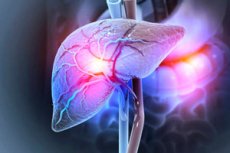Nye publikasjoner
Rollen til hUC-MSC i behandlingen av akutt leversvikt: mekanistiske bevis
Sist anmeldt: 02.07.2025

Alt iLive-innhold blir gjennomgått med medisin eller faktisk kontrollert for å sikre så mye faktuell nøyaktighet som mulig.
Vi har strenge retningslinjer for innkjøp og kun kobling til anerkjente medieområder, akademiske forskningsinstitusjoner og, når det er mulig, medisinsk peer-evaluerte studier. Merk at tallene i parenteser ([1], [2], etc.) er klikkbare koblinger til disse studiene.
Hvis du føler at noe av innholdet vårt er unøyaktig, utdatert eller ellers tvilsomt, velg det og trykk Ctrl + Enter.

Akutt leversvikt (ALF) er et livstruende klinisk problem med begrensede behandlingsmuligheter.Mesenkymale stamceller (hUC-MSC) utvunnet fra humane navlestrengsblod kan være en lovende tilnærming for behandling av ALF. Denne studien tar sikte på å undersøke rollen til hUC-MSC i behandlingen av ALF og de underliggende mekanismene.
En modell av ARF hos mus ble indusert ved administrering av lipopolysakkarid og d-galaktosamin. Terapeutiske effekter av hUC-MSC-er ble vurdert ved å analysere aktiviteten til serumenzymer, histologisk tilstand og celleapoptose i levervev. Nivået av apoptose ble analysert i AML12-celler. Nivåene av inflammatoriske cytokiner og fenotypen til RAW264.7-celler dyrket sammen med hUC-MSC-er ble bestemt. C-Jun N-terminal domene kinase/nukleær faktor kappa B signalvei ble studert.
HUC-MSC-behandling reduserte serumnivåene av alaninaminotransferase og aspartataminotransferase, reduserte patologisk skade, dempet hepatocytt-apoptose og reduserte dødelighet in vivo. Samkultur med hUC-MSC-er reduserte nivået av AML12-celle-apoptose in vitro. Dessuten viste lipopolysakkarid-stimulerte RAW264.7-celler forhøyede nivåer av tumornekrosefaktor-α, interleukin-6 og interleukin-1β og et høyere antall CD86-positive celler, mens samkultur med hUC-MSC-er reduserte nivåene av disse tre inflammatoriske cytokinene og økte andelen CD206-positive celler. Behandling med hUC-MSC-er hemmet aktiveringen av fosforylert (p)-kinase C-Jun N-terminalt domene og p-nukleær faktor kappa-B, ikke bare i levervev, men også i AML12- og RAW264.7-celler som ble samkulturert med hUC-MSC-er.
Avslutningsvis kan hUC-MSC-er lindre AKI ved å hemme hepatocytter-apoptose og regulere makrofagpolarisering, og dermed kan hUC-MSC-basert celleterapi tjene som et alternativ for pasienter med leversvikt.
Resultatene er publisert i Journal of Clinical and Translational Hepatology.
